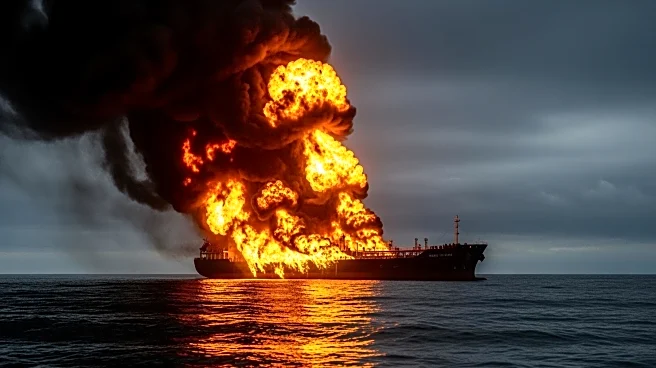What's Happening?
A fire erupted on a Cameroonian-flagged gas tanker named Falcon while it was traveling through the Gulf of Aden, resulting in the deaths of two mariners. The incident occurred on Saturday and was reported
by the U.S. Navy-overseen Joint Maritime Information Center. The fire, which appears to have been accidental, left the ship adrift off the coast of Yemen. Of the 26 crew members on board, 24 were safely evacuated, while two unfortunately perished. The crew consisted mainly of Indian nationals, with one Ukrainian. Initial reports from the British military's United Kingdom Maritime Trade Operations center suggested the tanker might have been hit by an unknown projectile, but this was later unconfirmed. Satellite images and photographs from the European Union's Operation Aspides showed the ship ablaze, with significant damage to its deck piping.
Why It's Important?
The incident highlights the ongoing risks faced by maritime operations in the Gulf of Aden, a critical shipping route. The area has been a hotspot for attacks, particularly by Yemen's Houthi rebels, although no such attacks have been claimed since a ceasefire in Gaza began on October 10. The Falcon was previously identified as part of an alleged Iranian 'ghost fleet' circumventing international sanctions, which adds a layer of geopolitical complexity to the situation. The fire underscores the vulnerabilities of maritime logistics and the potential for accidents to disrupt global shipping routes, impacting international trade and energy supplies.
What's Next?
The Falcon remains on fire and adrift, with a private firm expected to salvage the tanker. The incident may prompt further investigations into the safety protocols of ships operating in high-risk areas and could lead to increased security measures in the Gulf of Aden. The international community, particularly those involved in maritime trade, will likely monitor the situation closely to prevent similar occurrences and ensure the safety of shipping lanes.
Beyond the Headlines
The fire aboard the Falcon may have broader implications for international maritime law and the enforcement of sanctions. The ship's alleged involvement in an Iranian 'ghost fleet' raises questions about the effectiveness of current sanctions and the measures taken to enforce them. This incident could lead to increased scrutiny of ships operating in sanctioned regions and potentially stricter regulations to prevent similar situations.










